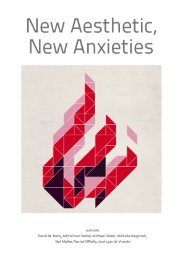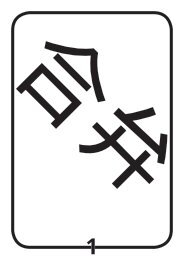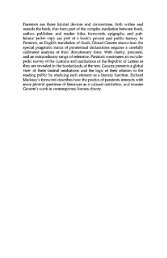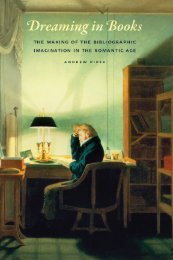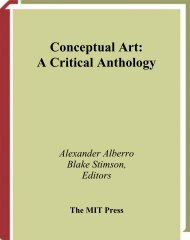You also want an ePaper? Increase the reach of your titles
YUMPU automatically turns print PDFs into web optimized ePapers that Google loves.
Lygia Clark and Helio Oiticica<br />
Letters/ /1968-69<br />
Hiilio OWcica and Lygia Clark shared an intense artistic dialogue throughout their<br />
careers. Excerpts of their correspondence below trace the evolution of their thinking,<br />
from interactive sculptural objects to group events that addressed external relations<br />
(OWcica) and in tenor psychological states (Clark). For both artists, a key term was<br />
vivencias, or lived expenence: the body's heightened sensory presence as authentic,<br />
immediate, and resistant to ideological capture.<br />
26 October 1968<br />
Dearest He!iCaetaGerio,'<br />
[ ... [<br />
Since Caminhando [Walking, 1963[, the object for me has lost its significance, and<br />
if I still use it, it is so that it becomes a mediator for participation. With the<br />
sensorial gloves, for example, it gives the measure of the act and the miraculous<br />
character of the gesture, with its spontaneity, which seems to have been<br />
forgotten. In all that I do, there really is the necessity of the human body, so that<br />
it expresses itself or is revealed as in a first [primary[ experience. For me it<br />
doesn't matter whether I am avant-garde or placed within new theories. I can<br />
only be what I am and I still intend to produce those films in which man is at the<br />
centre of the event. For me, the stones that I come across, or the plastic bags, are<br />
one and the same: they are there only to express a proposition. I don't see why<br />
we should negate the object simply because we have constructed it. It is<br />
important that it should be expressive. If I feel in my life today the state that you<br />
feel and define as hallucinatory, it is because through these propositions I have<br />
learnt to feel these same moments, and if I had not done so, perhaps I would<br />
have never discovered these same moments that are fantastic. What I want is to<br />
avoid schematizing anything, and each day eat a new 'pear', to see if it's good or<br />
not. Mario's [Pedrosa [ term, as always is excellent, but for me it is not about the<br />
moment of chance but the 'fruit' of the moment. Fruit in the fruit sense, such is<br />
the flavour and the sensuality of eating, of living this moment. I also found it<br />
very good when you said that already in the rudimentary element the open<br />
structures are liberated despite the fact that we use it precisely because we no<br />
longer believe in the aesthetic concept. At the end your text is splendid with<br />
regard to the poetic lived experience [vivenda poetica [ and the subjective charge,<br />
only I do not believe, as I mentioned above, in the marginality of who proposes;<br />
110// ARTISTS' WRITINGS



